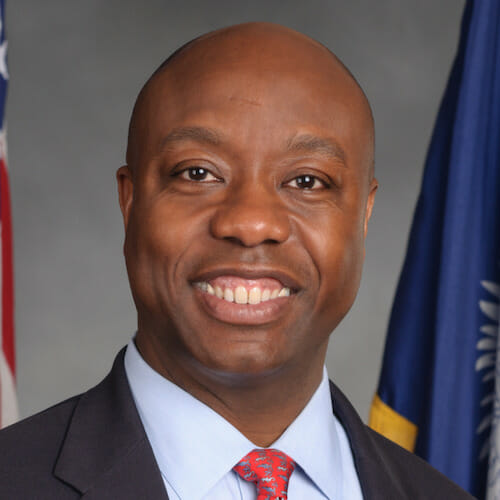
The ranking member of the Senate Special Committee on Aging is turning up the heat on the Centers for Medicare & Medicaid Services, asking the agency’s chief to describe its efforts to establish quality measures for Medicaid home- and community-based services such as those provided by some assisted living operators.
In a letter to Centers for Medicare & Medicaid Services Administrator Chiquita Brooks-LaSure last week, Sen. Tim Scott (R-SC) asked when CMS intends to propose rulemaking or guidance on establishing standard quality measures for the program, as described in a September 2020 request for information. Universally recognized standards would allow better oversight and help prevent fraud, he wrote.

“After decades of funding rebalancing, there are still no generally accepted quality measures for HCBS. It remains impossible to compare states’ Medicaid HCBS along quality measures in a scorecard, such as CMS compiles for other Medicaid elements,” Scott said.
The letter follows a report that the senator released last month meant to highlight what Scott said is “deepening concern” about the administration of HCBS. The report, he said, exposed the lack of universally accepted quality-control benchmarks for HCBS.
In 2020, the Department of Health and Human Services’ Office of the Inspector General said it consistently finds that programs and their beneficiaries may be vulnerable to fraud and abuse in home and community-based settings, Scott reported.
Although policymakers sometimes confuse assisted living with skilled nursing, industry advocates have encouraged them to include assisted living communities in the broader conversation on appropriate rebalancing of long-term services and supports.
Industry advocates had a measured response to Scott’s idea of quality reform, noting the wide range of settings and services in home-based care that could complicate such a proposal. LeadingAge, for example, would encourage any discussion of new quality measures to keep in mind the breadth of services that fall under the HCBS umbrella, a spokesperson told McKnight’s Senior Living.
“Any creation of a quality measure strategy would have to take into account the variation in each type of HCBS care setting, with the likely result that each setting would need unique measures in addition to more general overall measurements for the entire sector,” the spokesperson said.
Existing quality improvement and reporting programs from states and stakeholder organizations could serve as models, said Lindsay Schwartz, associate vice president of workforce and quality improvement for the National Center for Assisted Living.
“We should remain focused on using existing measures that have been proven to improve quality and are meaningful to residents and family members,” Schwartz said. “Home- and community-based services are provided in a wide array of settings as well as to a wide array of individuals; therefore, it is crucial that quality measures are tailored to each setting and those individuals receiving care. NCAL has supported such efforts since 2012, she said.
Senior living operators for the most part are not federally regulated, although some assisted living operators provide HCBS to residents who are Medicaid beneficiaries, via state waivers. But the potential for fraud and abuse is evident.
In 2020, recoveries for Medicaid fraud in assisted living topped $1 million for the second consecutive year, although the high amount mainly was due to a case discovered after a murder, McKnight’s Senior Living previously reported. Efforts by state Medicaid Fraud Control Units resulted in a total of nine criminal convictions and almost $1.2 million in criminal monetary recoveries for fraud, resident abuse or neglect related to assisted living in fiscal year 2020. That’s according to an annual report released March 21 by the Department of Health and Human Services Office of Inspector General. An additional $577,506 was collected in civil recoveries.



